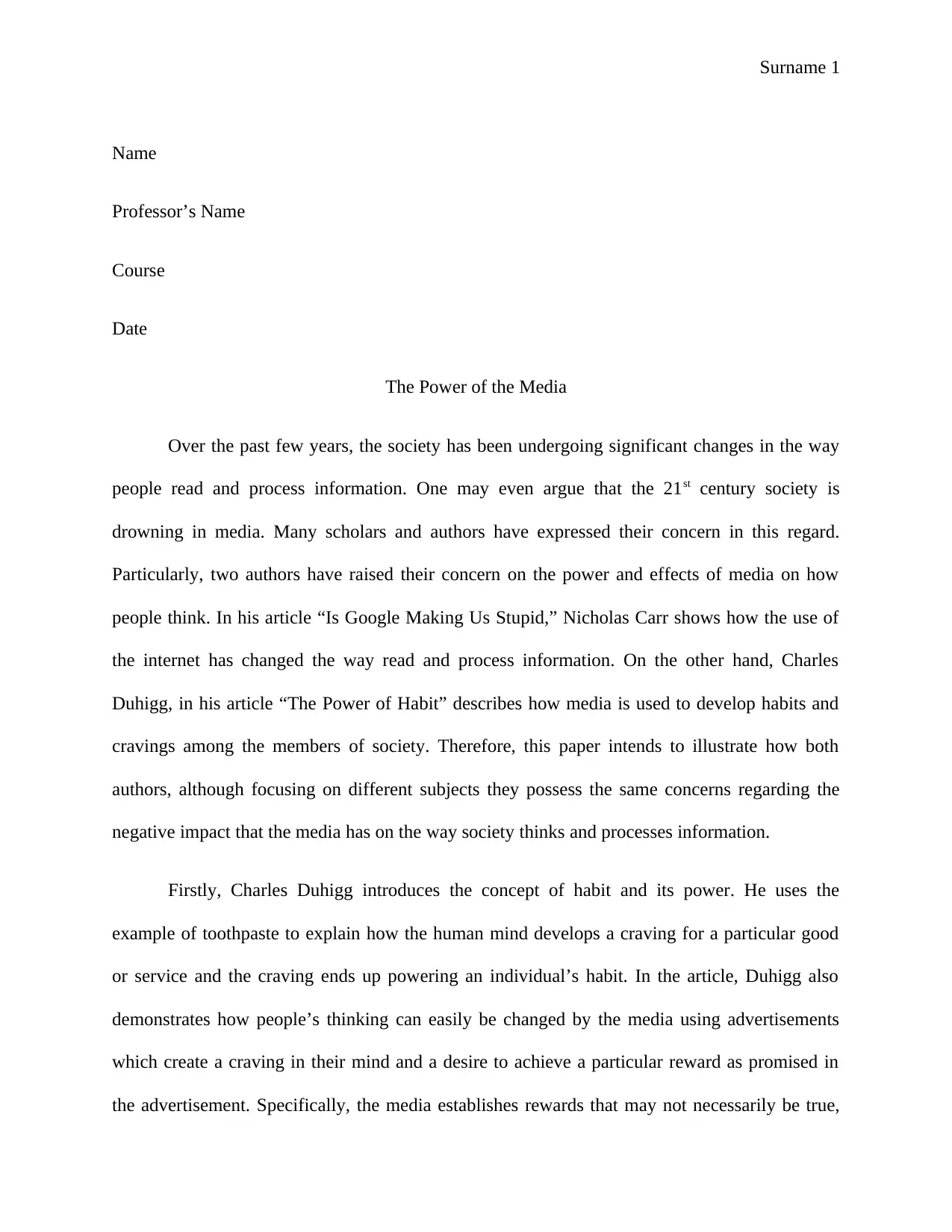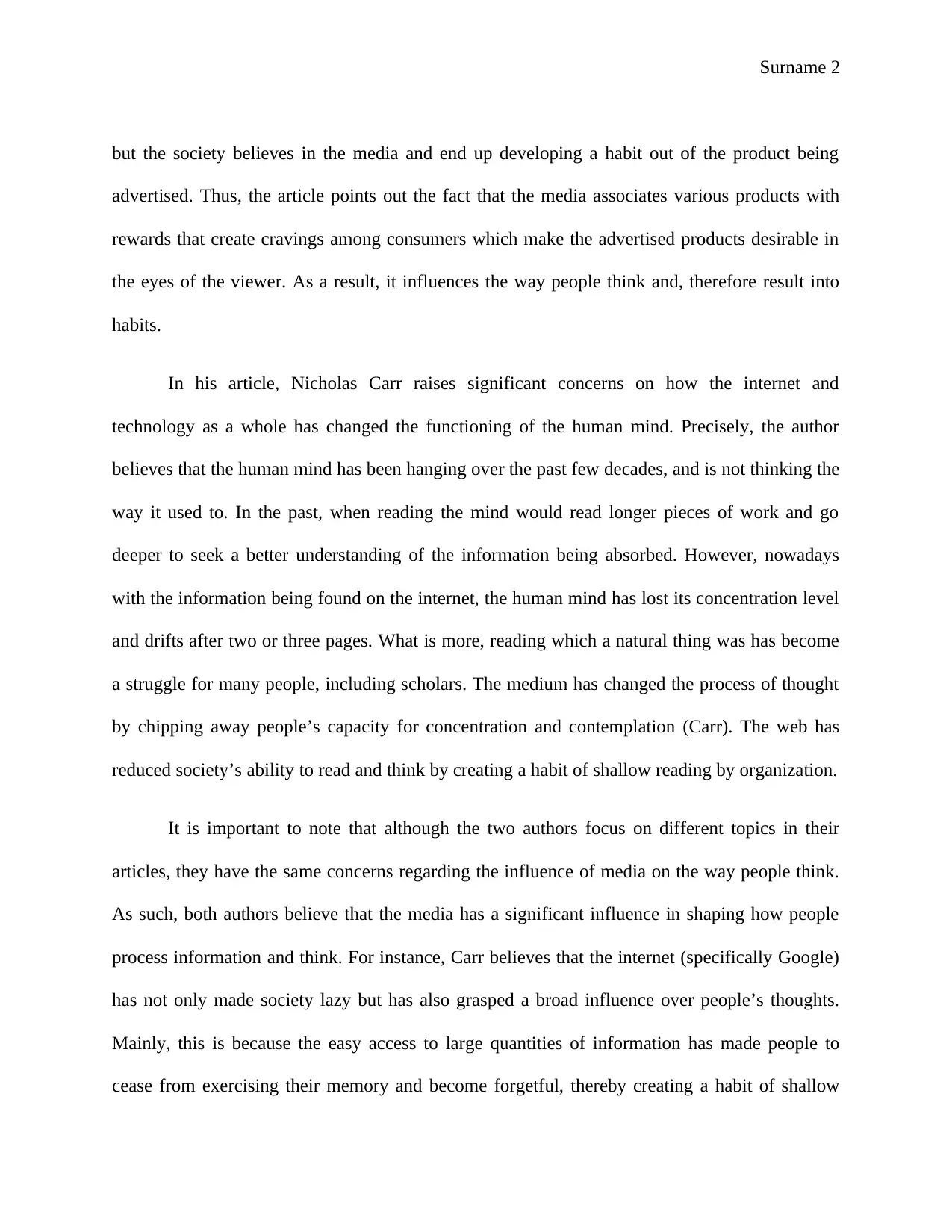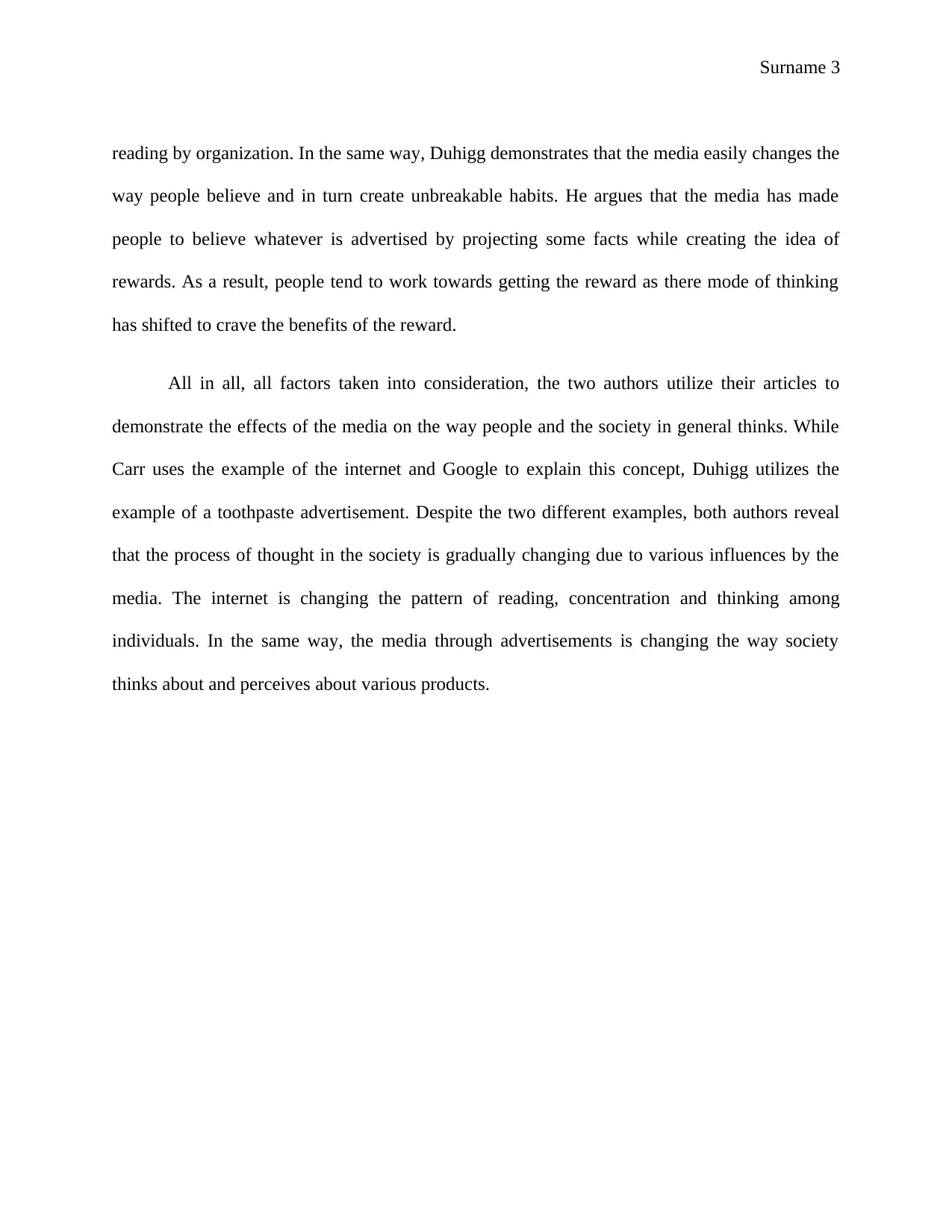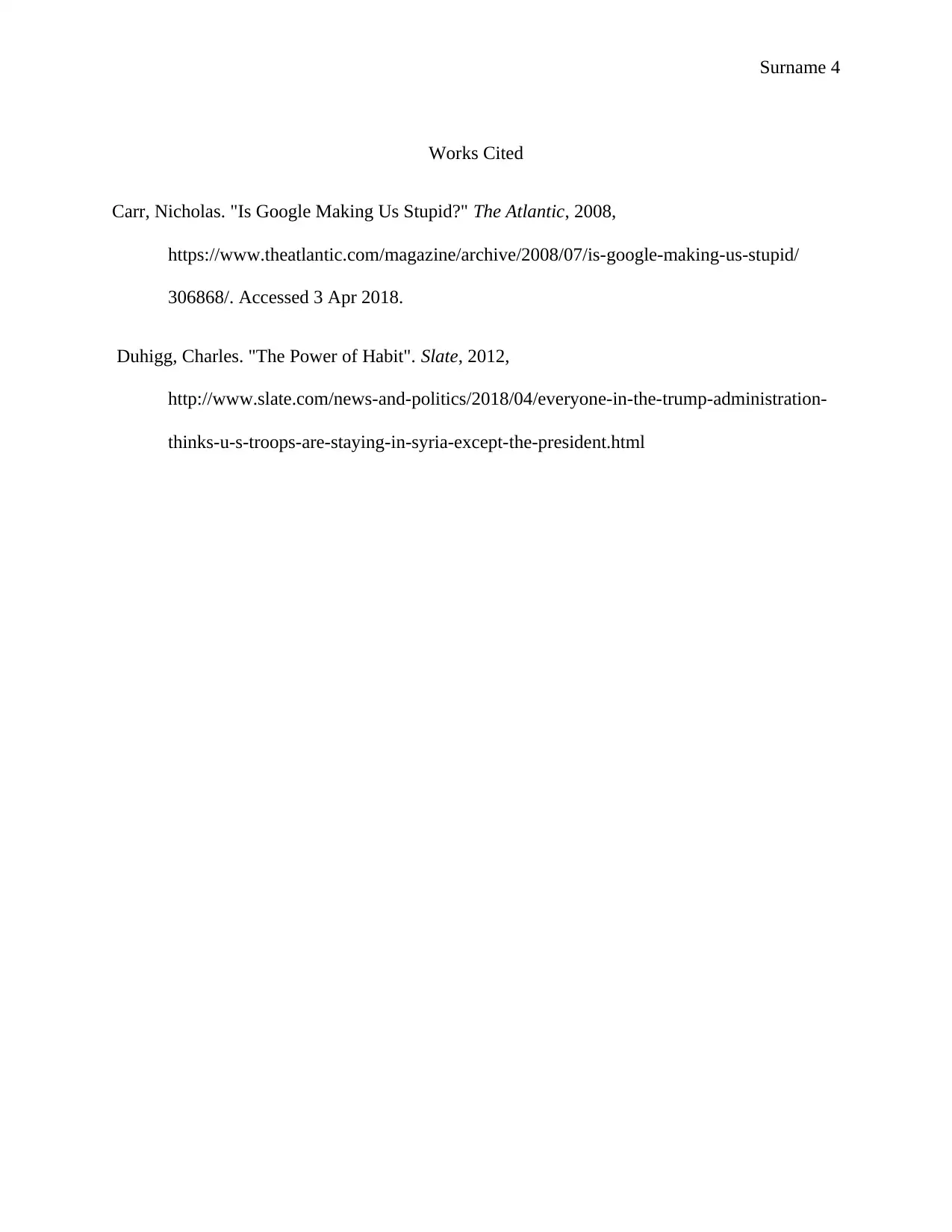A Comparative Analysis of Media's Impact on Thought: Carr and Duhigg
VerifiedAdded on 2023/06/13
|4
|905
|311
Essay
AI Summary
This essay explores the concerns raised by Nicholas Carr and Charles Duhigg regarding the negative impact of media on society's thinking and information processing. Carr, in "Is Google Making Us Stupid," discusses how the internet alters reading habits and concentration, while Duhigg, in "The Power of Habit," examines how media-driven advertisements create cravings and habits. The essay argues that both authors, despite focusing on different subjects, share similar concerns about media's influence on thought processes. Carr believes the internet fosters shallow reading and impairs memory, while Duhigg demonstrates how media manipulates beliefs through advertising, creating habits by associating products with often misleading rewards. Ultimately, both authors reveal how media, whether through the internet or advertising, is reshaping how individuals perceive and interact with the world.

Surname 1
Name
Professor’s Name
Course
Date
The Power of the Media
Over the past few years, the society has been undergoing significant changes in the way
people read and process information. One may even argue that the 21st century society is
drowning in media. Many scholars and authors have expressed their concern in this regard.
Particularly, two authors have raised their concern on the power and effects of media on how
people think. In his article “Is Google Making Us Stupid,” Nicholas Carr shows how the use of
the internet has changed the way read and process information. On the other hand, Charles
Duhigg, in his article “The Power of Habit” describes how media is used to develop habits and
cravings among the members of society. Therefore, this paper intends to illustrate how both
authors, although focusing on different subjects they possess the same concerns regarding the
negative impact that the media has on the way society thinks and processes information.
Firstly, Charles Duhigg introduces the concept of habit and its power. He uses the
example of toothpaste to explain how the human mind develops a craving for a particular good
or service and the craving ends up powering an individual’s habit. In the article, Duhigg also
demonstrates how people’s thinking can easily be changed by the media using advertisements
which create a craving in their mind and a desire to achieve a particular reward as promised in
the advertisement. Specifically, the media establishes rewards that may not necessarily be true,
Name
Professor’s Name
Course
Date
The Power of the Media
Over the past few years, the society has been undergoing significant changes in the way
people read and process information. One may even argue that the 21st century society is
drowning in media. Many scholars and authors have expressed their concern in this regard.
Particularly, two authors have raised their concern on the power and effects of media on how
people think. In his article “Is Google Making Us Stupid,” Nicholas Carr shows how the use of
the internet has changed the way read and process information. On the other hand, Charles
Duhigg, in his article “The Power of Habit” describes how media is used to develop habits and
cravings among the members of society. Therefore, this paper intends to illustrate how both
authors, although focusing on different subjects they possess the same concerns regarding the
negative impact that the media has on the way society thinks and processes information.
Firstly, Charles Duhigg introduces the concept of habit and its power. He uses the
example of toothpaste to explain how the human mind develops a craving for a particular good
or service and the craving ends up powering an individual’s habit. In the article, Duhigg also
demonstrates how people’s thinking can easily be changed by the media using advertisements
which create a craving in their mind and a desire to achieve a particular reward as promised in
the advertisement. Specifically, the media establishes rewards that may not necessarily be true,
Paraphrase This Document
Need a fresh take? Get an instant paraphrase of this document with our AI Paraphraser

Surname 2
but the society believes in the media and end up developing a habit out of the product being
advertised. Thus, the article points out the fact that the media associates various products with
rewards that create cravings among consumers which make the advertised products desirable in
the eyes of the viewer. As a result, it influences the way people think and, therefore result into
habits.
In his article, Nicholas Carr raises significant concerns on how the internet and
technology as a whole has changed the functioning of the human mind. Precisely, the author
believes that the human mind has been hanging over the past few decades, and is not thinking the
way it used to. In the past, when reading the mind would read longer pieces of work and go
deeper to seek a better understanding of the information being absorbed. However, nowadays
with the information being found on the internet, the human mind has lost its concentration level
and drifts after two or three pages. What is more, reading which a natural thing was has become
a struggle for many people, including scholars. The medium has changed the process of thought
by chipping away people’s capacity for concentration and contemplation (Carr). The web has
reduced society’s ability to read and think by creating a habit of shallow reading by organization.
It is important to note that although the two authors focus on different topics in their
articles, they have the same concerns regarding the influence of media on the way people think.
As such, both authors believe that the media has a significant influence in shaping how people
process information and think. For instance, Carr believes that the internet (specifically Google)
has not only made society lazy but has also grasped a broad influence over people’s thoughts.
Mainly, this is because the easy access to large quantities of information has made people to
cease from exercising their memory and become forgetful, thereby creating a habit of shallow
but the society believes in the media and end up developing a habit out of the product being
advertised. Thus, the article points out the fact that the media associates various products with
rewards that create cravings among consumers which make the advertised products desirable in
the eyes of the viewer. As a result, it influences the way people think and, therefore result into
habits.
In his article, Nicholas Carr raises significant concerns on how the internet and
technology as a whole has changed the functioning of the human mind. Precisely, the author
believes that the human mind has been hanging over the past few decades, and is not thinking the
way it used to. In the past, when reading the mind would read longer pieces of work and go
deeper to seek a better understanding of the information being absorbed. However, nowadays
with the information being found on the internet, the human mind has lost its concentration level
and drifts after two or three pages. What is more, reading which a natural thing was has become
a struggle for many people, including scholars. The medium has changed the process of thought
by chipping away people’s capacity for concentration and contemplation (Carr). The web has
reduced society’s ability to read and think by creating a habit of shallow reading by organization.
It is important to note that although the two authors focus on different topics in their
articles, they have the same concerns regarding the influence of media on the way people think.
As such, both authors believe that the media has a significant influence in shaping how people
process information and think. For instance, Carr believes that the internet (specifically Google)
has not only made society lazy but has also grasped a broad influence over people’s thoughts.
Mainly, this is because the easy access to large quantities of information has made people to
cease from exercising their memory and become forgetful, thereby creating a habit of shallow

Surname 3
reading by organization. In the same way, Duhigg demonstrates that the media easily changes the
way people believe and in turn create unbreakable habits. He argues that the media has made
people to believe whatever is advertised by projecting some facts while creating the idea of
rewards. As a result, people tend to work towards getting the reward as there mode of thinking
has shifted to crave the benefits of the reward.
All in all, all factors taken into consideration, the two authors utilize their articles to
demonstrate the effects of the media on the way people and the society in general thinks. While
Carr uses the example of the internet and Google to explain this concept, Duhigg utilizes the
example of a toothpaste advertisement. Despite the two different examples, both authors reveal
that the process of thought in the society is gradually changing due to various influences by the
media. The internet is changing the pattern of reading, concentration and thinking among
individuals. In the same way, the media through advertisements is changing the way society
thinks about and perceives about various products.
reading by organization. In the same way, Duhigg demonstrates that the media easily changes the
way people believe and in turn create unbreakable habits. He argues that the media has made
people to believe whatever is advertised by projecting some facts while creating the idea of
rewards. As a result, people tend to work towards getting the reward as there mode of thinking
has shifted to crave the benefits of the reward.
All in all, all factors taken into consideration, the two authors utilize their articles to
demonstrate the effects of the media on the way people and the society in general thinks. While
Carr uses the example of the internet and Google to explain this concept, Duhigg utilizes the
example of a toothpaste advertisement. Despite the two different examples, both authors reveal
that the process of thought in the society is gradually changing due to various influences by the
media. The internet is changing the pattern of reading, concentration and thinking among
individuals. In the same way, the media through advertisements is changing the way society
thinks about and perceives about various products.
⊘ This is a preview!⊘
Do you want full access?
Subscribe today to unlock all pages.

Trusted by 1+ million students worldwide

Surname 4
Works Cited
Carr, Nicholas. "Is Google Making Us Stupid?" The Atlantic, 2008,
https://www.theatlantic.com/magazine/archive/2008/07/is-google-making-us-stupid/
306868/. Accessed 3 Apr 2018.
Duhigg, Charles. "The Power of Habit". Slate, 2012,
http://www.slate.com/news-and-politics/2018/04/everyone-in-the-trump-administration-
thinks-u-s-troops-are-staying-in-syria-except-the-president.html
Works Cited
Carr, Nicholas. "Is Google Making Us Stupid?" The Atlantic, 2008,
https://www.theatlantic.com/magazine/archive/2008/07/is-google-making-us-stupid/
306868/. Accessed 3 Apr 2018.
Duhigg, Charles. "The Power of Habit". Slate, 2012,
http://www.slate.com/news-and-politics/2018/04/everyone-in-the-trump-administration-
thinks-u-s-troops-are-staying-in-syria-except-the-president.html
1 out of 4
Related Documents
Your All-in-One AI-Powered Toolkit for Academic Success.
+13062052269
info@desklib.com
Available 24*7 on WhatsApp / Email
![[object Object]](/_next/static/media/star-bottom.7253800d.svg)
Unlock your academic potential
Copyright © 2020–2025 A2Z Services. All Rights Reserved. Developed and managed by ZUCOL.





